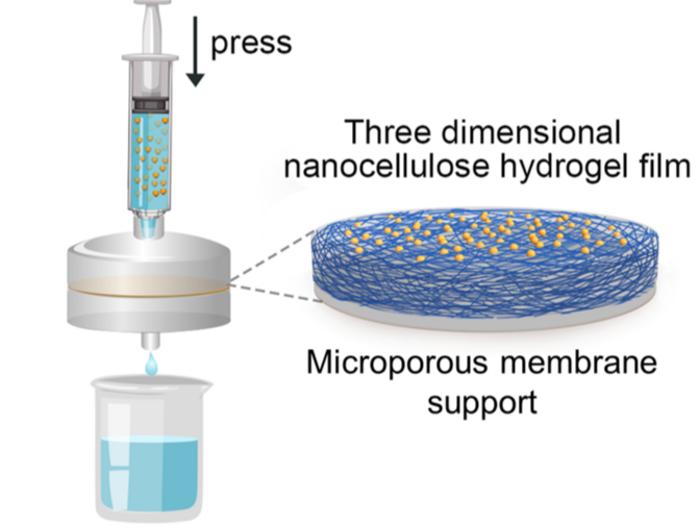More than 2 billion people, approximately a quarter of the world’s population, lack access to clean drinking water. A new, portable and affordable water filtration solution created by researchers at The University of Texas at Austin aims to change that.

Credit: The University of Texas at Austin
More than 2 billion people, approximately a quarter of the world’s population, lack access to clean drinking water. A new, portable and affordable water filtration solution created by researchers at The University of Texas at Austin aims to change that.
The new system collects dirty water with a syringe and injects it into a hydrogel filter that weeds out nearly all tiny particles. This device, the researchers say, offers significant advantages in cost, simplicity, effectiveness and sustainability compared existing commercial options, giving users the ability to easily decontaminate water from nearby streams and rivers and make it drinkable.
“The pressing concern of particle-polluted water, particularly in remote and underdeveloped regions where people frequently rely on contaminated water sources for consumption, demands immediate attention and recognition,” said Guihua Yu, a professor of materials science at the Cockrell School of Engineer’s Walker Department of Mechanical Engineering and Texas Materials Institute. “Our system, with its high efficiency in removing diverse types of particles, offers an attractive yet practical solution in improving freshwater availability.”
The research was published recently in Nature Sustainability.
Today’s options for portable water filtration of tiny particles mostly consist of filter paper and microporous membranes. According to the research, these devices filter out roughly 40% and 80% of particles larger than 10 nanometers, respectively. This new system catches close to 100% of these particles.
And it is made of low-cost, sustainable, readily available materials. The main innovation is an intertwined web of nanocellulose fibers that catches particles while the newly cleaned water passes through.
All the user has to do is take the syringe to the nearest water source, pull out the water and inject it through the filter. The system takes care of the rest, spitting out clean, drinkable water.
The filter system has been tested with several types of water sources, including muddy water, river water and water contaminated with microplastics. The hydrogel films are biodegradable and can be used up to 30 times before they need to be replaced.
The research team has tested the technology using syringes as large as 1.5 liters, about 40% of an individual’s daily drinking water needs. And they plan to continue developing the technology to use it at larger scales to tackle global drinking water needs.
The researchers were motivated by one of the United Nations’ Sustainable Development Goals to improve drinking water standards and sanitation worldwide. Meeting this goal, according to the U.N., will require a 6X increase in drinking water availability by 2030.
“The reality is, a large percentage of the world’s population lacks access to safe drinking water, even in places where fresh water sources are available,” said Chuxin Lei, lead author and a graduate student working in Yu’s lab, said. “There is an urgent need for simple, universal, and efficient materials and devices for purifying particle-contaminated water, which should be able to help people around the world obtain clean water.”
Team members on the project also include collaborators from Northeast Forestry University, Shanghai Tech University and Tsinghua University in China.
Journal
Nature Sustainability
DOI
10.1038/s41893-023-01264-9
Article Title
A bio-based nanofibre hydrogel filter for sustainable water purification
Article Publication Date
19-Jan-2024




